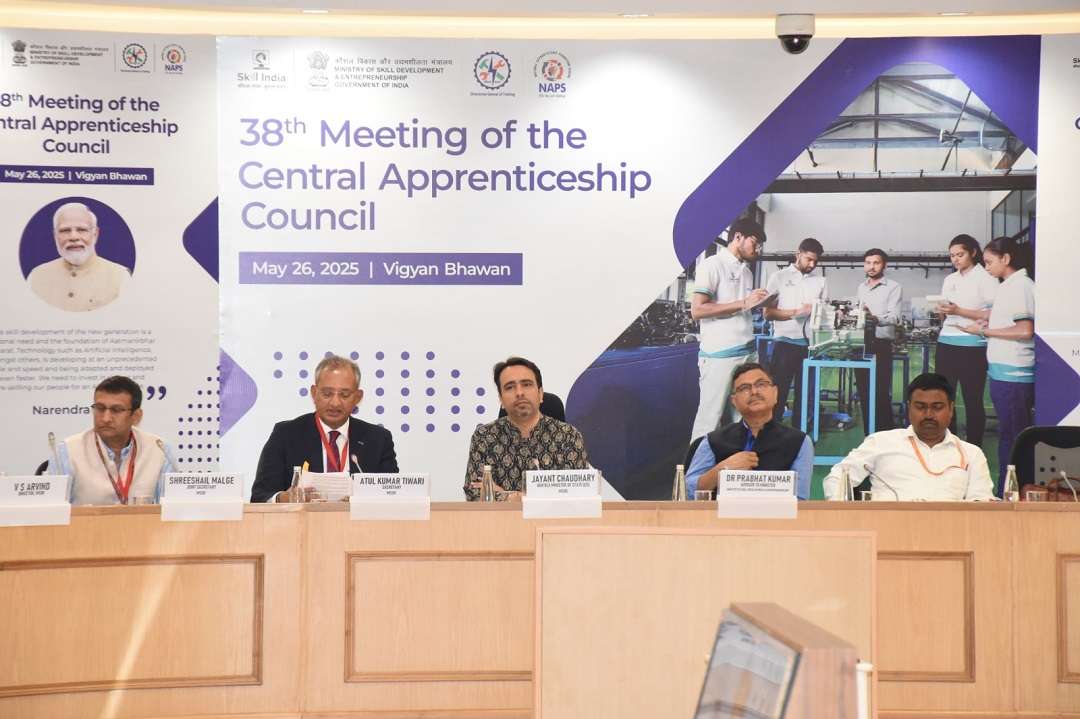The Central Apprenticeship Council (CAC), during its 38th meeting held at Vigyan Bhawan and chaired by Jayant Chaudhary, Minister of State (Independent Charge), Ministry of Skill Development and Entrepreneurship (MSDE), has recommended a 30% increase in stipend rates under the National Apprenticeship Promotion Scheme (NAPS) and National Apprenticeship Training Scheme (NATS). This move is aimed at encouraging wider participation in apprenticeship programmes and reducing dropout rates.
The revised stipend range is proposed to move from the current ₹5,000–₹9,000 to ₹6,800–₹12,300 per month. This adjustment, once approved by the Cabinet, is expected to make apprenticeship opportunities more attractive to young people across different sectors and skill levels.
The council also proposed that future stipend revisions be linked to changes in the Consumer Price Index (CPI), with automatic updates every two years, timed with the July salary adjustment cycle. The revision process will be overseen by the MSDE and reviewed by the appropriate committee under the Apprenticeship Rules, 1992.
In his address, Shri Chaudhary emphasized the need to make apprenticeship a mainstream career pathway. “Apprenticeship serves as a vital bridge between education, industry, and employment. We aim to make it more inclusive and impactful by introducing reforms that address regional disparities and promote participation among rural and underrepresented youth,” he said.
The meeting highlighted a series of key structural and regulatory reforms aimed at strengthening the apprenticeship framework in India. One of the major developments was the proposal to introduce updated terminology—such as Degree Apprenticeship, Institution, UGC, and Contractual Staff—to bring greater clarity and alignment between formal education and workplace training. To expand access and adapt to modern learning needs, the Council also recommended allowing apprenticeship training to be delivered through online and blended formats, ensuring flexibility while maintaining adherence to nationally approved curricula.
In addition, the Council proposed setting up new Regional Boards to enhance the reach and effective implementation of the National Apprenticeship Training Scheme (NATS) at the grassroots level. The creation of these boards is expected to streamline administration and improve coordination across states. As a measure to enhance safety and well-being, the idea of providing insurance coverage to apprentices during the training period was also discussed, adding a layer of protection for candidates participating in the programme.
To promote inclusivity, the Council proposed introducing the term Person with Benchmark Disability in alignment with the Rights of Persons with Disabilities (RPwD) Act. It also recommended that training slots in relevant trades be reserved accordingly, based on suitability and accessibility. Recognizing regional cost differences, the Council suggested that stipend levels be adjusted geographically to reflect local living costs, thereby improving retention and regional participation.
The Council recommended replacing the outdated 1987 industry classification with the NIC 2008 Code. This change will bring emerging sectors such as IT, telecom, biotech, and renewable energy under the apprenticeship framework. Future updates to the classification system will also be automatically incorporated. Further, it was suggested that Craftsmen Training Scheme (CTS) courses be notified alongside apprenticeship programmes to ensure alignment and timely enrollment.
Since the previous meeting held in June 2021, India’s apprenticeship model has expanded significantly. Over 43.47 lakh apprentices have been engaged under PM-NAPS across all states and union territories as of 19 May 2025. Participation from more than 51,000 establishments has been recorded, with women comprising 20% of the total apprentice population. The NATS initiative, targeting diploma and graduate holders, registered over 5.23 lakh new enrolments during FY 2024–25 alone.
Shri Chaudhary also released a report by KPMG titled “Data Analysis Report: National Apprenticeship Promotion Scheme (Feb 2018 – April 2025)”, which provides a comprehensive review of performance trends and impact metrics. The CAC includes representatives from Central and State Governments, industry leaders (including BHEL, Indian Oil, Tata Group, Maruti Suzuki, and Reliance), academia (UGC, AICTE), and labour organizations.
Advisors from ten states and experts in education and workforce development also participate in the council’s policy discussions. The policy changes and proposals discussed are expected to be critical in shaping the next phase of India’s skilling and apprenticeship reforms, aligned with the national development goals of Kushal Bharat, Viksit Bharat (Skilled India, Developed India).







